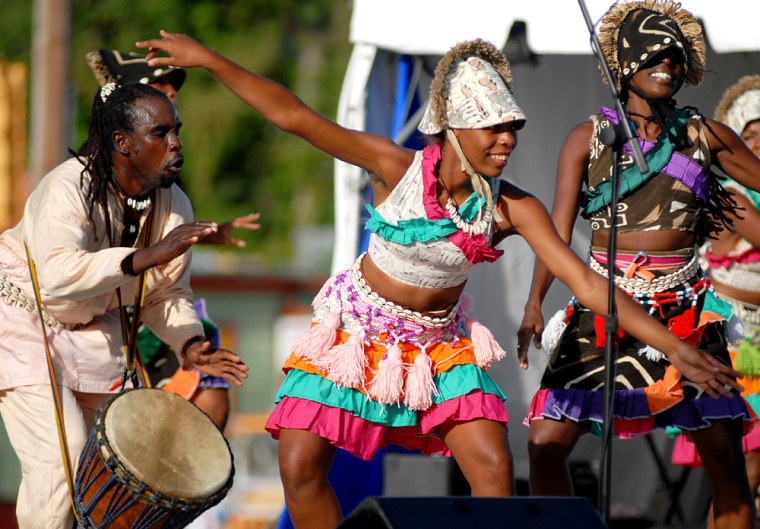People across the Caribbean bowed their heads for a moment of silence Sunday to mark the 200th anniversary of the end of Britain’s trans-Atlantic slave trade, which claimed millions of lives and shaped the region’s history.
In Jamaica, islanders held symbolic funeral rites in Kingston Harbour for African slaves who died during the perilous ocean crossing. In Dominica, there was an evening ceremony at the Baracoon building, where slaves were held for auction. In Guyana, the tribute was held in the compound of parliament buildings where slaves were beaten and sometimes hanged.
“We unite as a region and as a people, in a collective moment of reflection, as we remember one of the greatest tragedies in the history of humanity, which denied over 25 million Africans, for over 400 years, the basic human right of freedom, the right to self actualization and for so many, denial of even their basic right to life,” said Ralph Gonsalves, prime minister of St. Vincent and the Grenadines and chairman of the Caribbean Community.
People attending church services and memorials across the 15-member Caribbean Community bowed their heads in silence at noon to commemorate the anniversary, which was also marked in Africa and by some 3,000 people who marched through London on Saturday.
Enacted on March 25, 1807, the Slave Trade Act prohibited British ships from transporting slaves, although Britain did not abolish slavery in its territories until 1833.
Millions died
Although estimates vary, researchers say tens of millions of African men, women and children were enslaved and shipped to the Caribbean and the Americas, with millions dying in holding camps in Africa or during the trans-Atlantic voyage.
“Slavery was based on criminality, callous greed and murder,” said Violet Jean Baptiste, a spokeswoman for the Guyana-based African, Cultural and Development Association. “Members of royalty, insurance companies and banks ... politicians, clergymen and businessmen amassed fortunes on their human animals.”
A video message from British Prime Minister Tony Blair was played Sunday at Ghana’s Elmina Castle — where Africans were held before they were transported abroad — in which he expressed regret for his country’s role in the slave trade and for the “unbearable suffering, individually and collectively, it caused.”
Blair also condemned the slave trade earlier this year, but stopped short of offering an apology or compensation for slaves’ descendants. Activists criticized his careful language, saying it reflected the government’s fear of paying reparations.
The Royal Africa Company, founded in 1672 and based in London, was granted a monopoly in the slave trade. After its charter was revoked in 1698, Bristol and then Liverpool eclipsed London as slave trading centers, sending ships to Africa to acquire slaves to be sold in the New World.
Tobacco and sugar trade
Slaves were forced to work on plantations, growing crops such as tobacco and sugar. In Bermuda — the first British colony to import Africans — they were pressed into service constructing well-known landmarks such as the Royal Naval Dockyard.
“It’s extremely gratifying that we’re recognizing the atrocities of the slave trade,” said Barrett Bill, a construction worker who attended a memorial in Bermuda’s capital. “I’m also pleased to see a cross-section of races here. It gives me strong hope for the future of Bermuda.”
In Jamaica, more than 500 people, many dressed in African robes — including Prime Minister Portia Simpson Miller — joined a tribute to slaves who died during the ocean crossing.
“I know that we as a people have passed through a great deal of trouble,” Lennox Edwards, 41, of Kingston. “We have to remember what our foreparents went through. “
For some, the anniversary is an opportunity to explore the debilitating legacies of the slave trade, which have left some islanders unsure of their ancestry and questioning their identity.
“African history didn’t start with slavery, there was a long, important proud history in Africa before slavery,” said Halstead Byron, an adviser to the Nevis Ministry of Culture. “We need to look at what happened and see the positive things that came out of the eventual abolition of slavery and what has transpired since that with our own development.”
